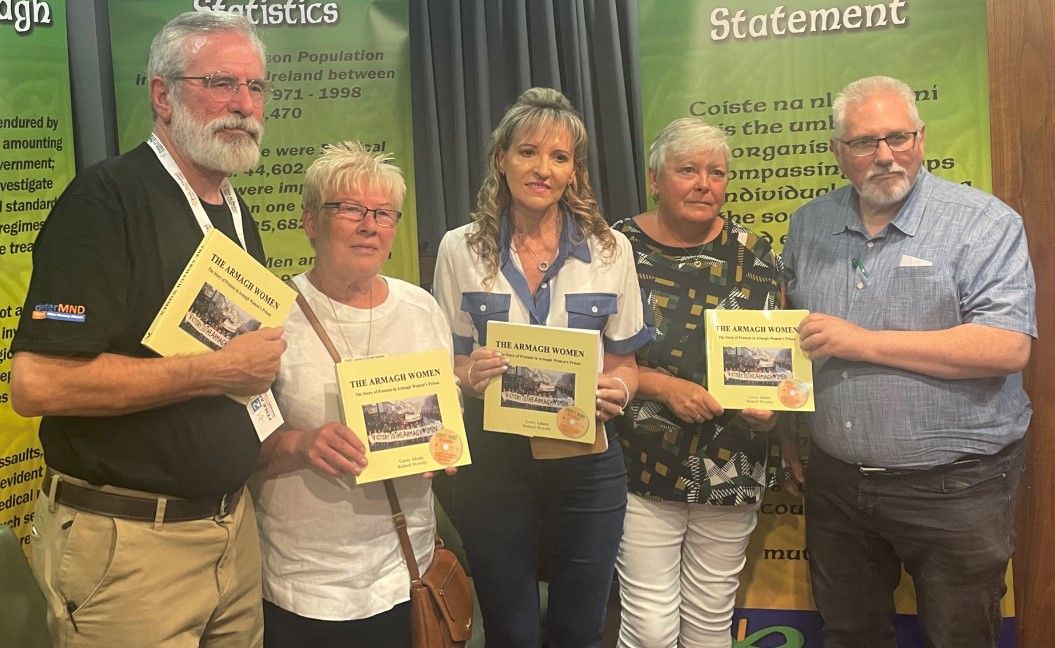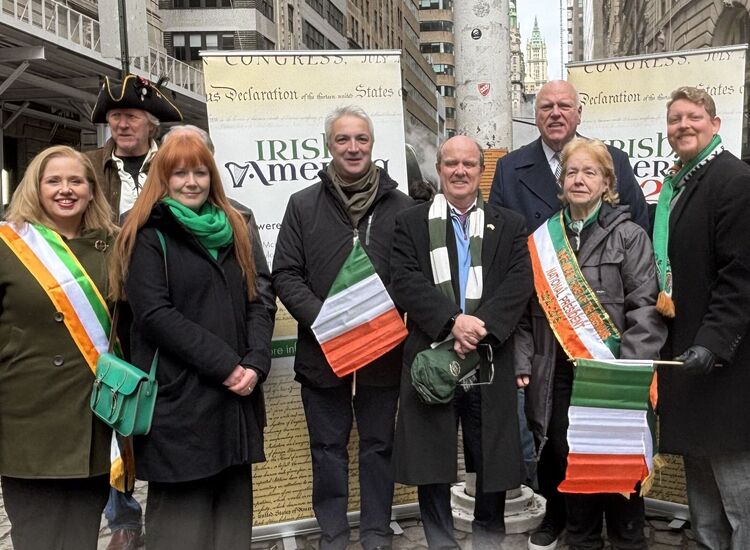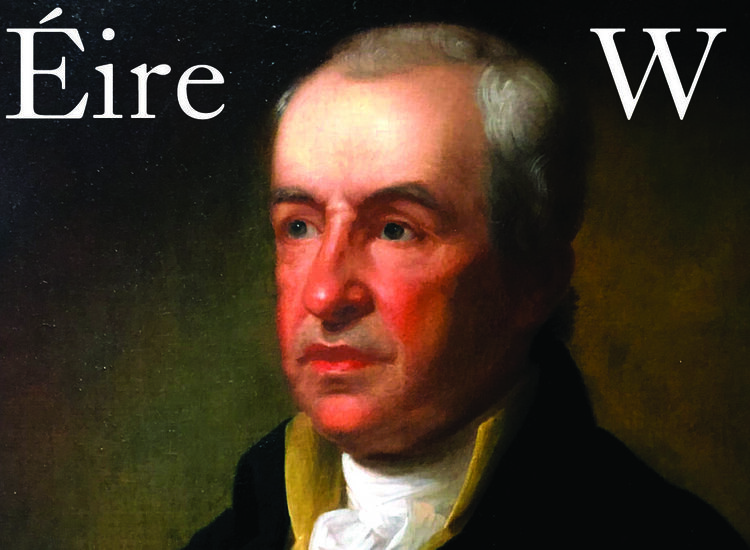Congratulations to Antrim Ladies All Ireland Football Champions 2022 and Antrim’s All Ireland Camogie Champions. Na mná abú.
Last Friday there was standing room only in The Felons as Richard McAuley and I were joined by former Armagh POWs Síle Darragh, Máire Cush and Martina Anderson for the launch of a new book, "The Armagh Women" during Prisoners’ Day.
The Armagh Women - The Story of Protests in Armagh Women’s prison - is a tribute as well as a history of republican women resisting oppression. The book begins with the construction of the prison in the 18th century. It outlines the imprisonment of republican women there in the 20s, 30s, 40s and 50s. Regrettably there is not a huge amount of information covering that period.
The Armagh Women primarily focuses on the period from 1970 to 1986 when the republican women political prisoners were moved to Maghaberry Prison. During those years hundreds of women, some as young as 16, and others in their 60s, were held in appalling, unhealthy, and frequently brutal conditions. They were from all parts of the North.
The book contains first-hand accounts of conditions and the women’s experience throughout the period. Through their own words we get a sense, a glimmer, of the extreme hardships they endured and of the daily battles, including hunger strike, that took place within the dark, forbidding walls of this 200-year-old prison.
The British government and prison regime sought to break the spirit of the Armagh Women. They embarked on a deliberate strategy aimed at dehumanizing the women, denying them basic personal hygiene products, forcing them to live in squalor and isolation, cut off from family, friends and the world outside. But despite this escalating campaign of punishments, intimidation and brutality the women refused to be broken.
Their camaraderie and solidarity to each other and to their comrades outside of the prison, was strengthened. Their resolve, their spirit and their commitment to their republican principles and objectives remained steadfast.
The book is also a testament to the courage and determination of those ar an taobh amuigh who campaigned initially during those years for political status, against internment, then against criminalization and subsequently in opposition to strip searching. The families formed the backbone of these campaigns, especially those who campaigned as the Relatives Action Committees. We are all indebted to their hard work, their courage, often in the face of threats and violence from the state, and their love.
On Sunday August 21 the National Hunger Strike March takes place in Belfast. It reminds us that Britain’s penal policy, which was an extension of its counter-insurgency strategy, failed - but at great cost in human life and suffering. It was defeated by the courage and selflessness of the republican women in Armagh and Maghaberry, and the men and women in other prisons. It took a heavy toll on the women and their families who endured it with them, on the men in the H-Blocks, and those who died on hunger strike and their families.
Richard McAuley speaking at the book launch.
Copies of The Armagh Women – The Story of Protests in Armagh Women’s Prison are available at £18 from An Fhuiseog 55 Bóthar na bhFál, (Falls Road) BT12 4PD: www.thelarkstore.ie
The Lark Store/An Fhuiseog
An Fhuiseog - The Lark, takes its name from the writings of Bobby Sands. The shop maintains as its core value, support for Irish Republicanism and the primary Republican objective of Irish Unity. Our stock gives expression to the various periods in the struggle for Irish freedom and the ending of partition in Ireland.
www.thelarkstore.ie; Facebook – An Fhuiseog/The Lark. All proceeds from the sale of The Armagh Women go to Green Cross.
Now for Féile 35!
Féile an Phobail was a triumph. I want to thank and congratulate the organizing committee and the hundreds of activists who made it all possible by their hard work. Féile just doesn’t happen. It takes a huge amount of planning throughout the year. The result was ten days during which a hundred thousand people attended scores of debates, discussions, 28 art exhibitions, music and sporting events, book launches and much more. Over 350 events with 90 percent of them free.
The genius of the Féile is that it allows the people of West Belfast to define our identity and share our experiences. With ourselves but also with visitors. Everyone is welcome. Féile is a celebration of all that is positive and exciting in West Belfast.
It was established in 1988 as a positive answer in part to the accusation that the people of this part of Belfast were "savages" and as a response to British state censorship, collusion, exclusion and the demonization of our citizens. It has grown to be the largest community festival on this island.
Its summer school, which included over 80 debates and discussions, make it the largest of its kind on these islands. I attended as many of these as I possibly could and participated in some as a panelist. They were informative, enlightening, and attracted packed audiences all of whom were happy to join in the conversations on climate action, united Ireland, the referendum on Irish Unity, women in the republican struggle, the war in Ukraine, language rights, the role of trade unions, the plight of the Palestinian people and much more.
Noah Donohoe’s Family Deserve Answers
On Saturday, several thousand people turned out at Belfast City Hall in a demonstration of solidarity and support for the family of Noah Donohoe. The 14-year-old was found in a storm drain in North Belfast in June 2020 after being missing for six days.
The PSNI handling of the case has brought widespread criticism. In particular, its request for information to be withheld under a Public Interest Immunity (PII) application has caused outrage. At the weekend the NIO attempted to distance Shailesh Vara MP, the recently appointed British Secretary of State, from the application. It claimed that the PII was made by the PSNI but it was Vara’s signing of the order which pushed the responsibility for deciding what can and cannot be made public over to the Coroner’s Office.
North Belfast MP John Finucane, whose family have been fighting a long campaign for truth into the murder of their father, human rights lawyer Pat Finucane, address Saturday’s protest. Expressing his solidarity with Noah’s mother Fiona and her family John told the family that they “do not stand alone, that when she fights for the answers she deserves through our legal system, she knows, everyone knows, that there are so many who stand with her and support her.”
While he had never met Noah John said that since his death, “it’s hard not to feel that we have all gotten to know something about this incredibly special boy who lived in Belfast, who went to St. Malachy’s College in North Belfast. A good student, a good friend, a basketball fan and someone who had their life ahead of them.”
The inquest into Noah’s death takes place on 28 November. The family’s legal team is currently preparing for the inquest as it has the potential to examine all of the issues, all of the questions that need to be answered, in a fair and transparent manner. And there are many questions around Noah’s disappearance. The manner in which the search was conducted. And the introduction of the Public Interest Immunity certificate.
The key to getting to the truth is openness and transparency. No hiding of any of the facts. The family seek justice. That is their right. And that is why so many support them.









